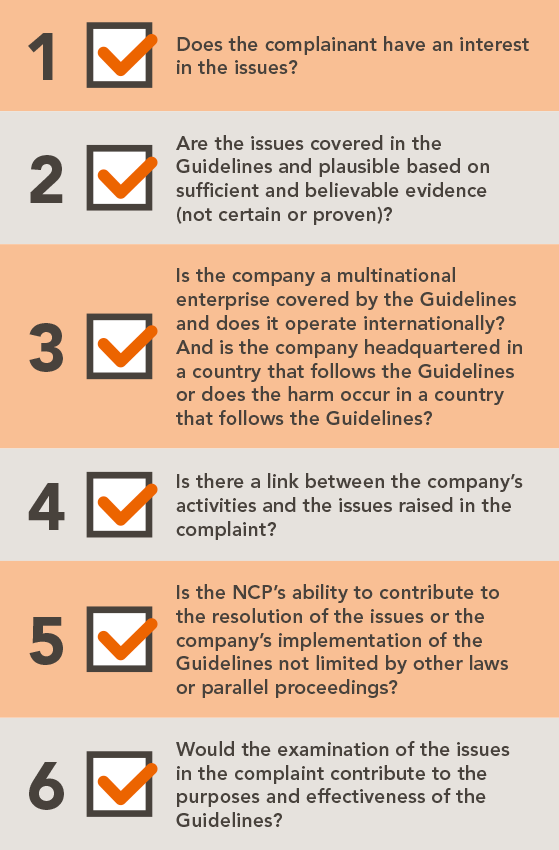After a complaint is submitted to a National Contact Point (NCP), the NCP conducts an initial assessment to decide if the case should proceed.

Initial assessment process
After a complaint is filed, the NCP should confirm receipt of the complaint within a couple of weeks. The NCP then takes about three months to evaluate the complaint to determine whether to accept or reject it – but some NCPs have taken much longer.
- If the NCP accepts the complaint, it will invite parties to proceed to the next stage.
- If the NCP rejects the complaint, the NCP must tell the parties the reasons for the rejection.
Most NCPs publish an initial assessment statement explaining the complainant’s basic allegations, the company(ies)’s response, the NCP’s decision to accept or reject the complaint, and the reasons for that decision. Initial assessments should be based only on information that both parties have seen and had the opportunity to refute.
Initial assessment evaluation criteria
To determine whether a complaint is admissible, NCPs should evaluate the complaint according to six “admissibility criteria” established in the Procedures in the OECD Guidelines:

NCPs should explicitly examine these six criteria only. The NCP should not, for example, also require the complainant to pursue other remedies before filing a complaint, set a statute of limitations, or reject a case if a company refuses to engage, if either party is unwilling to agree to confidentiality terms, or as a result of pressure from the company or a government office. During the initial assessment stage, NCPs should not begin an in-depth analysis of the evidence presented in the complaint or an extensive assessment of the company’s connection to the harm. Contact us if you feel an NCP has not followed these criteria appropriately.
An NCP may agree to proceed with all or only some of the claims in the complaint.
Role of complainants
As a complainant, you should anticipate being asked by the NCP to clarify aspects of the complaint or provide additional evidence through written submissions, on calls, or in meetings. You may be invited to comment on the draft initial assessment statement.
Complainants often wonder how much they can communicate about the case during the initial assessment stage. We have developed guidance on transparency and confidentiality for complainants and companies during the NCP complaint process.
Role of companies
Because the OECD Guidelines are not binding on companies, companies can choose not to engage in the initial assessment stage or complaint process overall.
- If a company decides to participate in the initial assessment, it will be asked to respond to the complaint and additional clarifying information. It may also be invited to comment on the draft initial assessment statement.
- If the company does not engage, we recommend complainants ask the NCP still to investigate the claims, make recommendations for improving the company’s compliance with the standards, and determine whether the company breached the OECD Guidelines. Contact us if you need advice on a company’s approach at this stage.

